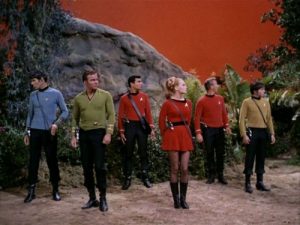I’m pleased to say that my post here two weeks ago, on the way that belief in progress depends on a certain kind of historical amnesia, got a lively and mostly thoughtful response. Oh, I fielded and deleted some saliva-flecked denunciations, to be sure, but that always happens when I try to pose hard questions about the faith-based mythology of perpetual progress that plays so important and unexamined a role in mass culture nowadays.

Faith in progress really is the established religion of our time. Most people nowadays believe in the inevitability of progress just as fervently as medieval peasants believed in saints and angels. What’s more, when the great majority of people talk about progress these days, they don’t simply mean that the technology of the future will be different from, and somewhat more complex than, the technology of today. No, it’s much more precise than that. Just as Joseph Campbell lopped and stretched all the world’s diverse mythologies into a single pattern he called the Monomyth, our collective imagination has done the same thing with the extraordinary range of possible futures our species might have, shrinking it down to a suffocatingly narrow and strictly enforced consensus we might as well call the Monofuture.
You know the Monofuture, dear reader. It’s been splashed across the media for decades, turned into the backgroud of an endless stream of repetitive movies and novels and video games, used just as repetitively to justify the downsides of the present. The Monofuture is when we finally get routine spaceflight, orbital habitats, colonies on other worlds—all the things my generation was promised in its childhood and hasn’t gotten yet. The Monofuture has fusion power or some other limitless clean energy source, it’s got equally limitless supplies of raw materials, and replicators or robot factories or some other gimmick so that everyone gets all the consumer goods they want. It’s got flying cars, of course, and humanoid robots, and superhumanly intelligent AIs, and all the other technological wet dreams that have been squirted across the imagination of the industrial world for decades now. For a place that doesn’t exist, it has immense emotional power, and one measure of that power is just how upset believers in the Monofuture get if you point out that it’s not going to happen.

Probably the easiest way to see this in operation is to suggest in public that human beings are never going to colonize other planets. If you do that, I can promise you that you’ll get an impressive degree of pushback. As it happens, there are a great many good reasons to think that human beings are in fact never going to colonize other planets. We can start with the nightmarish economics of establishing self-supporting colonies on the frozen, airless, bleach-laced deserts of Mars, go from there to the bleak fact that no other habitable body in the solar system besides Earth has a magnetic field capable of protecting vulnerable human tissues from the torrents of hard radiation blasting out from the vast unshielded thermonuclear reactor at the center of the solar system, and proceed through all the other reasons why manned space flight has turned out to be nothing more than an expensive and temporary hobby of rich nations.
Of course there are plenty of arguments in circulation as to why none of these things matter. It’s entertaining, if nothing else, to test these arguments against something that isn’t part of the Monofuture. For example—to return to a point that’s been made in this blog already—all the arguments that have been made for the colonization of Mars can be made with even more force for the colonization of central Antarctica. Compared to Mars, Antarctica is practically a tropical paradise: the climate’s significantly warmer, water and oxygen are much easier to come by, there’s a planetary magnetic field screening out most of the Sun’s dangerous radiation, mineral resources are at least as abundant, the soil’s not saturated with toxic perchlorates, getting there is easy with existing technology, and if something goes wrong, help can get there in a day or two—it’s not nine long and silent months away if Earth and Mars happen to be in the right orbital configuration just then, and anything up to twice that if you’re not so lucky.

You can make equally sound arguments why colonizing the top of Mount Everest, the bottom of the Marianas Trench, the waterless and windswept Takla Makan desert of central Asia, or just about any other environment on Earth makes more sense than colonizing Mars. All of them are better suited to human habitation than Mars, and Mars is better suited to human habitation than any other body in the solar system other than Earth. Why aren’t colonists signing up to colonize Antarctica, then? Because the colonization of Antarctica isn’t part of the Monofuture, and so most people can do the math and figure out that an Antarctic colony makes no sense.
Such clarity is rarely to be found when it comes to the Monofuture. What you get instead is a remarkable degree of devout enthusiasm propped up with some of the most colorfully absurd thoughtstoppers to be found in captivity. I lost track a long time ago, for example, of the number of people I’ve heard insist in this context that “anything that people can conceive, they can achieve.” That’s absurdity on a truly grand scale—I can conceive quite readily of a working perpetual motion machine, a Paddington Bear stuffie the size of the entire cosmos, a four-sided triangle, and colorless green ideas that sleep furiously, just for starters—but if you question the weary fantasy of space colonization, you can count not only on hearing it, but on watching those who propose it scramble around for reasons why a claim so obviously false in every other context must be true in this one.

You can have serious fun with those who insist on the thoughtstopper just cited, if that interests you. Ask someone who believes in it whether human beings will ever be able to predict the future by observing the movements of the planets, for example, and you can be sure of getting an indignant denial! Astrology, while it’s quite easy for people to conceive—and indeed many millions of people today do so—isn’t part of the Monofuture, and so it’s not defended by the belief system we’re discussing. I’ve referred to that belief system as faith in progress, but again, the word “progress” has to be understood in a very nuanced way. Figuring out how to predict the future by observing planetary movements would be a very remarkable sort of progress indeed, but believers in progress aren’t interested in that. The kind of progress in which they place their faith is much more narrowly defined; it consists solely of progress toward the Monofuture.
And the Monofuture itself, with its space colonies and flying cars, its superintelligent computers and clever humanoid robots, its life-extension technologies and replicators churning out consumer goods from thin air at the push of a button, its limitless pollution-free energy sources and gleaming cities where people of every race and gender have exactly the same lifestyles and beliefs and opinions about everything that matters—where did it come from? How come this single, suffocatingly narrow notion of what the future has to be like has become such an item of faith in the industrial world that many people can’t imagine any other future at all—besides, that is, some masturbatory fantasy or other of apocalyptic mass death?
Here I have to hang my head and scuff my feet a little, because I’m pretty sure that the culprit is one of my favorite genres of literature. Yes, we’re talking about science fiction.

It’s only fair to say that science fiction didn’t start out talking about the Monofuture, or for that matter any of its standard-issue components such as space travel. Many historians of the genre agree that the first work of science fiction—the first story that centers on a scientific or technological development that hasn’t yet been achieved, and makes the consequences of that development central to the plot—is Mary Shelley’s Frankenstein, and that’s not about space travel or any of the other standard features of the Monofuture. For that matter, the next two really great names in the history of science fiction, Jules Verne and H.G. Wells, devoted relatively little of their prodigious literary output to space travel or other Monofuturistic gimmicks.
What’s more, if you go on to the next golden age of science fiction, the pulp era between the wars, and read the stories as they appeared in the magazines of that era, you’ll find that a great many of the stories went out of their way to ignore the Monofuture or anything like it. Plenty of those stories were set in the ordinary world of the 1920s and 1930s, just as Frankenstein was set in the ordinary world of the late 18th century, and the discoveries and inventions described in the stories don’t change the world in the least. While most of those stories have sunk into oblivion at this point—some deservedly, some not—it occurs to me that a few of my readers may have read C.S. Lewis’s science fiction novel Out of the Silent Planet, which is cut from the same cloth.

Lewis’ story is a tale of space travel. The mad scientist who is an important character (and also, of course, one of the stock figures of the pulp SF era) has achieved the major technological breakthroughs needed to cross interplanetary space, and the protagonist of the series, an Oxford philologist named Elwin Ransom—yes, he was modeled by Lewis on a friend of his, another Oxford philologist named J.R.R. Tolkien—thus finds himself taking an unexpected journey to Mars. Does the world change utterly as a result? Not at all. When Ransom eventually gets back to Earth, he goes to the nearest pub to buy a pint in the serene certainty that nothing much on Earth has changed, or will change, as a result of the journey.
Mind you, stories already in print when Out of the Silent Planet was first published had begun the process of inventing the Monofuture, and you can find plenty of anthologies of old SF stories that cherrypick Monofuturistic tales out of the great mass that had nothing to do with space ships and flying cars. (That’s why it’s such an education to go back to the magazines as they appeared, and get a sense of what else science fiction was doing in those days.) Nor was the Monofuture the only game in town for a long time thereafter. If anything, as science fiction matured after the Second World War, the range of futures it was willing to explore broadened dramatically.

Now of course part of that had to do with something most people in SF won’t talk about these days—the huge crossover between pre-1980s science fiction and occultism. The takeover of science fiction fandom by materialist pseudoskeptics of the CSICOP variety in the early 1980s marked a radical shift in the genre. Before that time, a great many SF fans and no small number of important SF authors were up to their eyeballs in popular occultism. That’s why you’ll find a tolerably good description of parts of an early Wiccan initiation ritual in Heinlein’s novel If This Goes On…, why more than half the big names in 1950s and 1960s SF wrote novels in which psychic powers were the mainspring of the plot, and why the classified ads in the back of SF magazines were full of advertisements for occult correspondence courses. (It’s also why the first science fiction convention I ever attended, back in 1978, included workshops on Tarot divination—not something you found in such venues much after that.) It was a different world, a lot more open to alternative realities.
Still, there was a great deal more to it than that. Science fiction authors vied with each other in those days to come up with future societies that varied as wildly as possible from the world we inhabit today. Read Vonda McIntyre’s Dreamsnake, John Crowley’s Beasts, Brian Aldiss’ Hothouse, Susan Coon’s Rahne, M. John Harrison’s The Pastel City, and Poul Anderson’s The Winter of the World—just to cite the examples that come first to mind—and in each case you’re so far away from the Monofuture that you’d need a high-powered Macroscope to spot its traces way out there in the intergalactic distance.

Exactly what happened to science fiction in the decades immediately thereafter is a complex question. I suspect that part of it had to do with the space probes that brought back picture after picture of a solar system far less welcoming to human beings than anyone in the golden age of SF had ever speculated. Part of it, too, had to do with the awkward discovery that none of the many attempts to make space-based manufacturing pay for itself came close to breaking even, and let’s not even talk about living up to the enthusiastic handwaving in Arthur C. Clarke’s The Promise of Space and its many equivalents. Another part, surely, had to do with the mutation of SF from fringe literature to mass-market media property, a process set in motion by the frankly hokey if durable Star Trek franchise and propelled to warp speeds by the immense financial success of such Hollywood cash cows as Star Wars and E.T.: The Extraterrestrial.
Whatever the concatenation of causes, though, what had been one of the most innovative of literary genres became by and large as rigidly formulaic as Harlequin romances, with the Monofuture playing the role of the ruggedly handsome male lead and humanity as the female lead swooning into his cybernetically enhanced arms. One measure of that descent into formula was the chorus of outrage that rose in SF fandom a little while back when Kim Stanley Robinson, one of the best of the current crop of SF authors, published a frankly brilliant novel titled Aurora about a failed attempt at interstellar colonization. Such stories were entirely acceptable back when SF was open to a wider range of futures—John Brunner’s harrowing Total Eclipse and John Crowley’s lyrical Engine Summer are only two of many novels that used it as a theme—but the reaction to Robinson’s book? Here again, Harlequin romances offer the best equivalent: it’s exactly the sort of reaction you’d expect if Harlequin published a well-written romance novel in which the heroine, after meeting the hero and going through the usual plot twists, decided that she really did prefer to stay single after all.

That parallel, I suspect, points straight toward the reason why the monofuture has become stuck sideways in the collective imagination of our time. People don’t read Harlequin romances because they want realistic accounts of love; they read Harlequin romances because they want to enjoy a particular kind of fantasy that’s satisfying precisely because it doesn’timitate real life. That’s what formulaic genre fiction does—and there’s nothing wrong with that. If readers feel a little better about themselves and the inevitable frustrations of their lives because they have the chance to wallow in lush daydreams about rich and ruggedly handsome guys who fall in love with ordinary women, or heroic adventures in which a mismatched bunch of protagonists wield the Magic McGuffin of Doom to save Upper Lower Southeast Central Earth from Lord Blorg the Bad, or cozy mysteries in which the middle-aged owner of the You Know You Want One More Chocolate Bonbon Shop single-handedly catches one diabolical murderer after another, or what have you, why, that’s one of the basic human needs that literature has always served.
Most of us, though, realize that our own romantic encounters aren’t going to have much of anything in common with what goes on between the covers of a Harlequin romance. Most of us understand that our chances of being called forth on a heroic quest to liberate Upper Lower Southeast Central Earth from Lord Blorg the Bad are significantly lower than our chances of winning the Publishers Clearing House Sweepstakes, and that if we end up witnessing a serious crime, the closest we can expect to get to feats of brilliant detection is a series of long sessions repeating the same eleven facts to bored detectives in a downtown office building. That is to say, we understand the difference between imaginative literature and the real world, and don’t pretend that the latter is under some kind of obligation to imitate the former.

That, in turn, is exactly where the contemporary myth of progress toward the Monofuture has run off the rails. It’s not just that there are solid reasons why we will never colonize other planets, or that flying cars have been built and tested repeatedly since 1917 and consistently turn out to be a lousy idea, or that fusion power was twenty years in the future when I was born and will still be twenty years in the future when the distant descendants of chipmunks study our fossilized bones. It’s that by most measurements, the quality of life for a majority of people in the US and a good many other industrial countries has been moving raggedly but remorselessly downhill since the 1970s and show no sign of changing direction.
Leave the enclaves where the comfortable preen themselves on how progressive they are, and go walk the mean streets of Pittsburgh, Baltimore, Manchester, Glasgow, the decaying industrial faubourgs that ring Paris—well, I could go on at length, but the point stands: from those places, it’s easy to see that the Monofuture isn’t coming closer at all. It’s moving further off, heading to whichever elephant’s graveyard dreams seek out when it’s their time to die. That’s why so many people insist in such shrill terms that the Monofuture is still on its way, just you wait and see. As social psychologists have been pointing out for a good long time, it’s when a belief system no longer does an adequate job of explaining the world that people cling to it most dogmatically and get most irritable when it’s questioned.
One of my readers in a recent open post mentioned that in the circles he frequents, at least, the New Age belief system that was once so widespread has become rare enough that it’s a source of surprise when someone starts talking about creating their own reality and the rest of it. What happened there was no surprise to those who were paying attention. New Age teachers made a series of claims about what their teachings would do, and by and large, those claims didn’t pan out. The impressive number of people who tried to use New Age guru Rhonda Byrne’s “Law of Attraction” to get rich flipping real estate in the years immediately before the 2008-2009 crash, and lost their shirts as a result was just the last and biggest of a series of comparable fiascos.

Since the normal human response to that kind of failure is to double down at least once, what happened after the 2008-2009 crash is that a huge number of New Agers staked everything on the supposed end of the Mayan calendar on December 21, 2012. When that day came and went without incident, in turn, the New Age movement quietly dissolved. There are still people who believe in its teachings, to be sure, and in fact little enclaves of true believers are the normal aftermath of a failed prediction of this sort, but as a significant cultural force, it’s finished.
Exactly what will do the same thing to the cult of the Monofuture is an interesting question. That something will pull the plug on Tomorrowland sooner or later, though, is baked into the cake at this point. Science fiction, delightful though it is, is no more about real futures than romance novels are about real relationships, and the fate of the New Age movement demonstrates clearly enough what happens when true believers insist that the universe is obligated to cater to an overdeveloped sense of entitlement and fork over the future they think they deserve, just because they think they deserve it. What sequence of events will deliver that awkward but inescapable lesson to believers in the Monofuture is an interesting question; all things considered, though, I don’t think we’ll have to wait indefinitely to find out.






